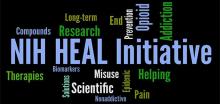Contact: Timothy Lyden
Contact Email: timothy.lyden@NIH.gov
Location:
REGISTER AND JOIN WEBINAR | 2 PM EST
1-650-479-3208
Access Code: 627-988 317 (If possible, please use a phone for audio and not the computer speakers)

We will host a free Q&A Webinar Tuesday January 29, 2019 at 2 PM EST to discuss Funding Opportunity Announcement RFA-NS-19-010 and RFA-NS-19-020. These FOA’s are a part of the NIH HEAL (Helping to End Addiction Long-Term) Initiative.
RFA-NS-19-010
Optimization of Non-addictive Therapies [Small Molecules and Biologics] to Treat Pain (UG3/UH3 Clinical Trial Not Allowed)
RFA-NS-19-020
Optimization of Non-addictive Therapies [Small Molecules and Biologics] to Treat Pain - (U44 Clinical Trial Not Allowed)
The purpose of these funding opportunity announcement (FOA) are to support preclinical optimization and development of safe, effective, and non-addictive small molecule and biologic therapeutics to treat pain. The goal of the program is to accelerate the optimization and development of promising small molecule and biologic hits/leads towards clinical trials. Applicants must have a promising hit/lead, robust biological rationale for the intended approach, and identified assays for optimization of the agent. The scope of this program includes optimization and early development activities, IND-enabling studies, and assembly of Investigational New Drug (IND) application. This is a milestone-driven phased cooperative agreement program involving participation of NIH program staff in the development of the project plan and monitoring of research progress.
Panelists:
- Charles Cywin – Program Director, Blueprint Neurotherapeutics Network
- Chris Boshoff – Scientific Project Manager, Cooperative Research to Enable and Advance Translational Enterprises for Biotechnology Products and Biologics (CREATE Bio)
There will be a short presentation by Drs. Cywin and Boshoff followed by a question and answer session. All questions will be asked via text. You are welcome to listen to the webinar on your phone, but you can only ask questions if you are registered and logged in to the webinar. If you would like to submit any questions prior to the webinar, please send them to timothy.lyden@NIH.gov.
